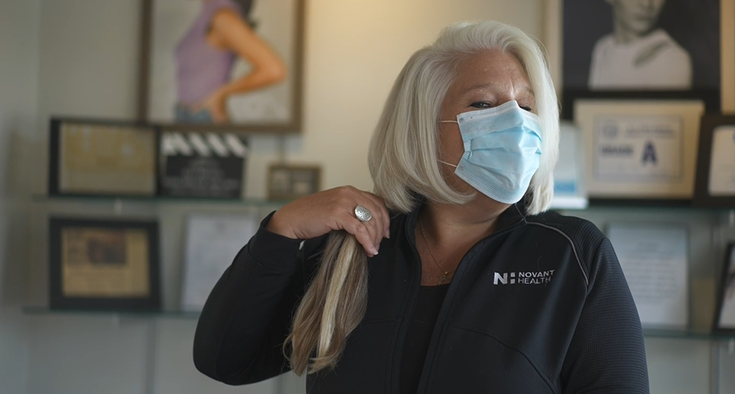When you’re undergoing cancer treatment, you may have questions about your diet and how you can give your body the nutrients it needs to fight disease. And you’re going to run into a lot of advice from advocates who may recommend dramatic changes in eating habits to incorporate trends like raw, vegan diets and juice cleanses.
It’s true that good nutrition supports your immune system and energy levels while supporting your body during and after surgery, chemotherapy and other cancer treatments. Certain foods can even help you cope with the side effects of cancer treatments. Food-related stress, however, cannot.
But Rebekah Culp, dietitian at Novant Health Cancer Institute in Charlotte, advises patients against embracing a radical change in their diet promoted by “experts” and others on the internet.
“Nutrition is important, but I do not want people to fear food or to feel angst about every single choice,” she said. “When you’re facing a serious illness, making dramatic changes is not only overwhelming, it could also cause harm or make you feel worse.”
Rather than taking an all-or-nothing approach, Culp recommends smaller steps, custom-tailoring your diet to your own needs as determined by your treatment and, sometimes, the type of cancer you have.
Cancer-treatment side effects
Cancer treatments may include surgery, chemotherapy, radiation therapy and hormone or immunotherapy. Unfortunately, they can cause uncomfortable (though usually temporary) side effects, including:
- Constipation and/or diarrhea.
- Nausea and vomiting.
- Difficulty swallowing.
- Severe fatigue.
- Increased or decreased appetite (which can cause unwanted weight gain or loss).
To minimize these and other side effects, Culp and her colleagues help patients determine which foods may make them feel better or worse. For example, someone suffering from constipation would benefit from avoiding cheese, highly processed foods, red meat and other high-fat, low-fiber foods.
“And, if a patient has diarrhea, which can lead to dehydration and deplete nutrients, we’d talk about which foods — like dairy products, caffeinated or alcoholic beverages and foods high in saturated fat — can make the condition worse.”
When eating becomes a problem
For patients suffering from nausea, Culp recommends bland foods, or, if necessary, a nutritious liquid diet. Spicy, fatty or high-fiber foods may make nausea worse — as can hunger. To avoid an empty stomach, she suggests nibbling on crackers and other bland foods that don’t tax your digestive system.
On the other hand, people undergoing hormonal or immunotherapy may find themselves feeling more hungry. An increased appetite, often combined with fatigue, can cause unwanted weight gain. Focusing on nutrient-rich foods, like those found in a Mediterranean diet, nourishes the body while keeping weight in check.
If swallowing becomes difficult — as a result of radiation to the head-and-neck area, for example — Culp recommends choosing moist, soft foods, like chicken salad, potato salad or foods served with gravy or sauces. Sucking on hard candies and sipping water can also help keep your mouth wet, she said. Or ask your physician or pharmacist about over-the-counter dry-mouth remedies.
Eating to target specific cancers
Different types of cancer have unique causes and characteristics, many of which are tied to nutrition. That’s why, to help patients heal and alleviate some of their cancer symptoms, Culp and her colleagues rely on a targeted approach. For example, she offered the following:
- Prostate cancer: “Egg yolks contain a nutrient called choline, which is very concentrated in prostate cancer cells — and studies have shown that high dietary choline intake and higher plasma choline levels increase the risk of prostate cancer,” she said. So, Culp recommends people with prostate cancer eat no more than two egg yolks per week.
- Pancreatic cancer: People with pancreatic cancer often have trouble digesting fat and sugar, and may also have trouble with their blood sugar, Culp said. Reducing the amount of greasy, fatty foods they eat can help ease indigestion, while eating healthy, smaller meals and snacks throughout the day helps stabilize blood sugar.
- Lung cancer: Lung cancer patients tend to require more calories than others because their bodies often have to work harder to breathe (and some treatments can raise their metabolism). In this case, the focus is on taking in more calories in a nutritious way, to avoid weight loss and tissue deterioration.
If this story is helpful, here's another you might like.
Taking supplements during treatment
Because they’re not regulated by the U.S. Food and Drug Administration, supplements may contain unwanted ingredients or fail to deliver the dose you see on the label, Culp said.
“Our body absorbs nutrients better when we get them through real foods,” she said. “Plus, food also delivers other important components like fiber, probiotics and the antioxidants and phytonutrients that can help prevent cancer.”
If you choose to take supplements, check with your oncologist first. High doses of vitamins, minerals and herbs delivered by supplements — as opposed to the amounts found in foods — may interfere with cancer treatments.
7 tips to help you eat well during cancer treatment
Eating during treatment doesn’t have to be complicated, though it may require a flexible, creative approach. Culp offered the following tips:
- Embrace the “plate method.” Fill 50% of your plate with a rainbow of fruits and vegetables, 25% with lean protein and 25% with whole grains. Include healthy fats from foods like salmon, avocado and nuts.
- Skip raw diets and juice cleanses. Instead, listen to your body and ensure your diet includes plenty of protein, whole grains and fiber —much of which is lost when juicing or blending fruits and veggies.
- Try cooked produce. The difference in nutrition between raw and properly cooked (not overcooked) fruits and veggies is negligible. “Go with what’s best for you, whatever that looks like,” Culp said.
- Prioritize protein. Protein builds and maintains healthy cells and muscle mass, aiding in post-surgical healing. If you prefer to avoid meat, try protein shakes, low-fat yogurt and plant proteins (from quinoa, beans and nuts).
- Snack throughout the day. Eating balanced snacks that include protein, fat and carbohydrates can help you keep up your strength and prevent unwanted weight loss.
- Stay hydrated. Water and other non-caffeinated beverages are best, as caffeine can act as a diuretic (leaving your body less hydrated). Also, avoid alcohol, a carcinogen and known risk factor for cancer.
- Avoid any food that causes discomfort. “Even if an online article claims 'this is the healthiest food ever,’ and you don’t like it, I’d avoid it,” Culp said “While you’re undergoing treatment, allow yourself some grace, and choose foods that make you feel good.”












